International Technical Support Newsletter No 21, February 2024
- Editorial
- PASII-ECOBUSAF-SOCSTAF project coordination
- Statistics Denmark’s view of the study visit focusing on employment and the informal sector at INSEE
- INSEE at the centre of Tunisian economic studies: the European Savoirs Éco in Tunisia project
- Heading south: modernising Bolivia’s national accounts
- A new gateway to the Far East: a Twinning project with the Cambodian NSI
- ERETES at INSEE Head Office and in Liberia, Tunisia and Bolivia
- New Developments
- Software Installations
- Joint support from AFRISTAT and INSEE on the communication of statistics
- Designing and drafting of Policy Briefs
- Data visualisation
- INSEE attends 46th AFRISTAT Executive Committee meeting
- A summary of INSEE’s cooperation activities in the second half of 2023
- Regional activities
- Sub-Saharan Africa
- The Maghreb and Mediterranean Basin
Editorial
Improving the way in which activities carried out by all parties providing international technical support are coordinated is essential in order to prevent the duplication of effort, to effectively deliver support where it is required, and to ensure efficiency. The PASII (Pan African Statistics Programme II) activities are a good example of this approach towards facilitating improvements, in which INSEE has played an intrinsic role. In the first article of this issue, we therefore discuss the challenges faced and the method used to tackle them.
Aside from this ongoing European project, INSEE provided a high level of support in different geographical regions during the second half of 2023. Savoirs Éco is a new European project that aims to boost and circulate economic knowledge in Tunisia, with special support being provided to the Tunisian National Institute of Statistics. In order to regain a foothold in the Andes and Asia, two areas where our activity has dipped in recent years, we are also engaged in a project to modernise Bolivia’s national accounts and acting as a junior partner in an EU twinning programme in Cambodia.
In Africa, the ERETES national accounts software continues to be rolled out, with missions being held in Tunisia and Liberia. In the area of communications, two training sessions held in collaboration with AFRISTAT taught participants how to draft policy briefs. A virtual workshop on data visualisation wrapped up these activities aimed at improving the circulation of official statistics among our partners in Africa. We also sat in on an AFRISTAT Executive Committee meeting.
The final part of this issue features a summary of all the activities completed over the past six months, including our continued involvement in multilateral projects and bilateral cooperations.
Lastly, we would like to welcome Harouna Traoré, who joined the division team in September 2023. Harouna’s work will focus on national accounts and ERETES.
We wish you all the best for 2024,
and hope you enjoy reading this issue.
PASII-ECOBUSAF-SOCSTAF project coordination
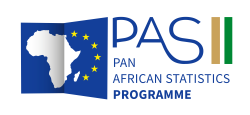
In recent decades, the international community has provided African countries with extensive technical assistance in connection with statistics. International or regional organisations and the National Statistical Institutes (NSIs) of developed countries have cooperated with African NSIs on statistics for some time through regional or national projects, some of which have received substantial funding.
However, no mechanism for coordinating stakeholder actions officially exists yet. Although attempts have previously been made to compile data on initiatives (such as Eurostat’s Donor Survey and Paris21’s Data Clearing House), those mechanisms do not allow for comprehensive and up-to-date information to be collected and for actions to be coordinated between partners.
Support may therefore be funnelled to a limited number of countries and recipients may be granted support from multiple providers.
The European PASII-ECOBUSAF and PASII-SOCSTAF grants form part of this ecosystem. Their success will therefore partly depend on whether African NSIs can establish a system of coordinating actions, or even collaborations, with the various organisations that provide African Union countries with support for issues that are also covered by the ECOBUSAF (Economic and Business Statistics) and SOCSTAF (Social Statistics) projects.
Such a system must make it possible to identify the initiatives carried out by the partners involved and also areas in which our two consortia would be adept at supporting those activities, for example fostering dialogue between NSIs, disseminating European statistical standards, establishing a pool of European experts whose skills complement each other, working at national level with a view to harmonising actions at European level.
Varying degrees of coordination according to how close the partners are to beneficiaries
Coordinating with international institutions is mainly a matter of exchanging information. Knowledge of the initiatives and the countries receiving support from international institutions will dictate what we do and the countries with which we ultimately cooperate. Great efforts were made on this front during the grant evaluation phase in which we held meetings with many stakeholders (regional World Bank branches, UN agencies such as Data4Development, the African Development Bank). This has helped us to identify common themes between our various projects, to prevent the duplication of effort and to create synergies, particularly in relation to national accounts, administrative data and alternative sources of data.
A second form of coordination was established with the other components of the project. In addition to the coordination organised at institutional level by Eurostat (a plenary consultation forum), this coordination has primarily been established:
- With the Expertise France team, which won the tender and is implementing the service agreement,
- With Ouvrir dans un nouvel ongletUNECA (the United Nations Economic Commission for Africa).
Connections were also established with the Food and Agriculture Organization of the United Nations (Ouvrir dans un nouvel ongletFAO).
A close collaboration on national accounts was established by means of the service agreement. In order to boost support for the countries trailing furthest behind, regular discussions were held to support those countries and create synergies between the forms of support offered by various PASII components. This collaboration is specifically being achieved by means of a single roadmap established under the service agreement, monitoring of this roadmap by all partners, joint missions and shared documentation (mission reports, in particular).
Close coordination within each project and between ECOBUSAF and SOCSTAF projects
Both projects hold their quarterly coordination meetings together, with a session reserved for discussing each grant and a joint session. Decisions on certain activities are made collectively, such as communication activities relating to the project, in particular. INSEE was additionally keen to involve the other consortia members in other activities.
A virtual workshop on Tourism Satellite Accounts is therefore scheduled for Q1 2024 and Statistics Denmark and Statistics Norway have agreed to help organise this event. A meeting with experts from these NSIs was held in Paris on 19 and 20 October to prepare for the workshop. Discussions at the meeting focused on practical ways to compile Tourism Satellite Accounts in the three target countries.
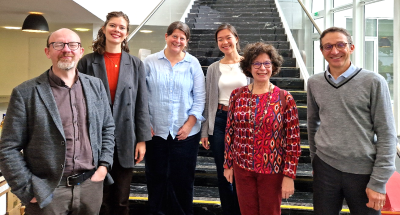
From left to right: Paul Lubson and Amalie Skovengaard (Statistics Denmark);
Anne Mari Auno (Statistics Norway); Alice Tchang and
Dominique Francoz (INSEE-DMCSI); David Levy (INSEE-DSE)
A hackathon is also planned for spring 2024 as part of the work on new data sources. A call for input has been issued to members of both consortia (ECOBUSAF and SOCSTAF) to provide mentorship to the teams throughout the hackathon and/or to sit on the panel of judges that will select the winning team.
Lastly, the organisation of the study visit focusing on employment statistics and the informal sector is a prime example of a collaboration involving multiple partners working both within and external to the SOCSTAF consortium. The contribution made by Statistics Denmark experts to this event meant that INSEE was in the unprecedented position of hosting English-speaking and French-speaking experts from African NSIs at the same event. Most of the sessions were held in separate rooms for English and French-speaking audiences, although there were a few sessions attended by both. The schedule for the visit had been set out jointly for both audiences, and a number of INSEE experts alternated between French and English when speaking.
The International Labour Organization (Ouvrir dans un nouvel ongletILO) is the international authority on standards and methods applicable to statistics on employment and the informal sector and is a key provider of support to African countries in connection with this. Its representative made a major contribution by giving presentations, the delivery of which alternated between French and English, covering five subjects: using administrative data for labour statistics, identifying decent work, operational definitions for identifying informal work, making the most of statistics from administrative sources in the national statistical system, and using statistics in the process of switching from the informal economy to the formal economy.
Lastly, AFRISTAT also contributed to the workshop on the informal sector.
The post-visit assessment revealed that attendees were very content and keen to continue their discussions on employment and informal sector statistics in a discussion forum, the organisation of which is still pending. Some attendees stated that there were not enough plenary sessions in which English and French speakers could have discussed the practices they adopt, which sometimes vary between French-speaking countries (Western and Central Africa) and English-speaking countries (Eastern and Southern Africa). However, this was the only complaint.
In conclusion, although coordination should be a major cause for concern for those parties engaged in international cooperation in Africa, it is difficult to establish and maintain a system in which information can be shared and stakeholders can work together. Although limited, the results in this regard have been interesting so far and could lay the foundations for a more permanent system of coordination: while some experiences have been positive (collaboration based on the PASII service agreement in the field of national accounts, organisation of the study visit focusing on employment and the informal sector), coordination was based on the initiatives of certain stakeholders, with members of the ECOBUSAF and SOCSTAF consortia frequently being the parties that initiated discussions.
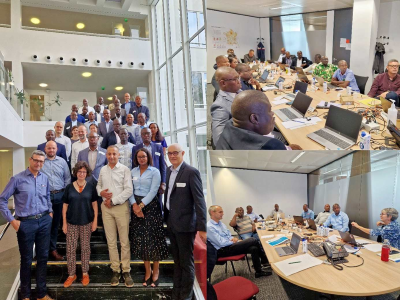
The visit focusing on employment and the informal sector at INSEE Head Office
Statistics Denmark’s view of the study visit focusing on employment and the informal sector at INSEE
Interview with Thomas Bie, Head of the Social Statistics Division, and Daniel F. Gustafsson, Chief Advisor, Social Statistics Division, Ouvrir dans un nouvel ongletStatistics Denmark
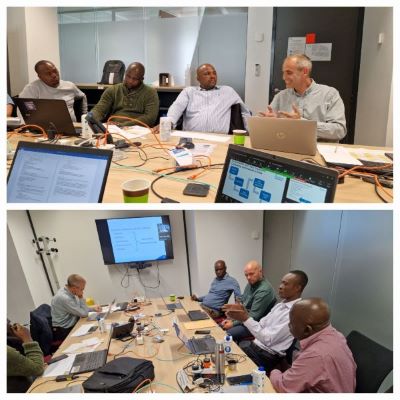
Thomas Bie (fourth from the right in the top photo), Daniel F. Gustafsson
(second from the right in the bottom photo), and participants at the session
« Our colleagues from Africa gave their verdict during the debriefing session: namely,
that some important and useful conclusions regarding the development of the statistics
on informal employment and the informal sector had been reached after a week with
many interesting discussions.
However, that does not contradict the fact that we, from Statistics Denmark, probably
learned even more about the statistical reality in Africa – and in particular about
Eswatini, Lesotho and Malawi whose representatives we worked most closely with during
the study visit.
As consultants our main contribution probably was to encourage our colleagues to keep
pushing for administrative data from the Finance Ministry and/or the Tax Authorities
or other authorities. Further, we advised on how to do that. Because, while administrative
data at present is far from a satisfactory or adequate data source in many African
countries, the administrative data can play a big role as the formal sector gradually
takes a bigger role, as compared to the informal sector. Administrative data can be
valuable, both as a direct data source to employment statistics, and as important
information when sampling for surveys.
It was an important part of the conclusion that bringing the needs for administrative
data forward, already now, would be relevant, because experience from Denmark and
other countries shows that it can take years to finalize such agreements.
Another joint learning had to do with the need for surveys on not only (formal and
informal) employment, but also the need to follow-up on these surveys, and to conduct
separate surveys on the informal sector.
Communication with the users of the data plays an interesting and relevant role.
The key question “what’s in it for me” can be used in door-opening talks with ministries;
also when it comes to the ever-returning matter of financing surveys etc. The usefulness
of statistics when it comes to knowledge-based decision and policy making simply is
just a very strong point to make. And it is important to remind yourself and others
about it.
The study visit was not only meaningful from a strictly professional point of view.
Human bonds were created, and the atmosphere in the meeting rooms was pleasant and
humoristic. The communication simply got better and better, the more we got to know
each other, and it would be a pleasure to meet again.
INSEE, and in particular Dominique Francoz, did a great job in enabling the study
visit under quite difficult circumstances. The agenda was rich, but a puzzle, with
key presenters from ILO and Afristat having to take place in different rooms, almost
at the same time. Furthermore, one has to admire the courage it must have taken to
invite around 12 countries, working in two official languages, and on top of that,
consultants from a cold, Nordic Country! But it was a successful week, and we felt
enriched and thankful to be part of it. »
INSEE at the centre of Tunisian economic studies: the European Savoirs Éco in Tunisia project
The aim of this new European project led by Expertise France is to support public debate on economic issues in Tunisia by consolidating the organisations that produce economic knowledge. The project’s launch event was held in Tunis in October 2023. The project will run until January 2026 and in the longer term should help to improve the way in which public economic policy is formulated.
Many parties in Tunisia stand to benefit from the project:
- The Tunisian Ministries of Economy and Planning and of Higher Education and Scientific Research;
- Operators and affiliated public organisations (Tunisian Institute for Strategic Studies, Ouvrir dans un nouvel ongletTunisian Institute of Competitiveness and Quantitative Studies, Ouvrir dans un nouvel ongletTunisian National Institute of Statistics);
- Academic, civil society and media organisations;
- Organisations that produce economic knowledge, such as civil society think tanks.
INSEE is working alongside the Foundation for Studies and Research on International Development (Ouvrir dans un nouvel ongletFerdi), the Global Development Network (Ouvrir dans un nouvel ongletGDN) and Ouvrir dans un nouvel ongletFrance Stratégie. Our expertise will naturally be provided to the Tunisian National Institute of Statistics, in the following areas:
- Improving the quality of business statistics: expertise in sources, enhancement, methods, integrated information system;
- Communication: strategy, social media, media relations, bringing various audiences together.
In line with the approach followed by the pilots for the project, any necessary synergies will be created between the various recipients of the support and the partners providing it, to ensure that actions are more effective and the anticipated objectives are met.
Heading south: modernising Bolivia’s national accounts
As requested by the French Development Agency (Ouvrir dans un nouvel ongletAFD), INSEE is using the agency’s funds and carrying out a project to help modernise the national accounts produced by Bolivia’s National Statistical Institute (Ouvrir dans un nouvel ongletINE) via a unique partnership involving neighbouring organisations, which will end in late 2026.
It quickly became apparent during discussions ahead of the project that it would be useful to involve other organisations because of their geographical proximity, shared interests and expertise. On this basis, Peru’s National Institute of Statistics and Informatics (Ouvrir dans un nouvel ongletINEI), which has gained extensive experience in the relevant fields (national accounts methods, informal sector measure, ERETES software deployment), was approached and agreed to join the project. An initiative of the Economic Commission for Latin America and the Caribbean (Ouvrir dans un nouvel ongletECLAC), a regional extension of the United Nations with experts in quarterly accounts and classifications, is also planned with a view to promoting South-South cooperation.
Changing the benchmark year for the national accounts, adopting the latest international standards, capturing data on subjects not covered by current surveys (informal and shadow economies) and introducing ERETES software are all part of the project’s programme. Completion of the project will take 170 person-days of work by INSEE and INEI staff. The first mission was to set out a roadmap for the project and was completed between 27 November and 8 December in Lima, followed by La Paz.
A new gateway to the Far East: a Twinning project with the Cambodian NSI
On 12 December, the European Union delegation in Phnom Penh officially announced that the Twinning contract with the National Institute of Statistics of Cambodia (Ouvrir dans un nouvel ongletNIS) had been awarded to the consortium led by the Italian National Institute of Statistics (Ouvrir dans un nouvel ongletISTAT), of which INSEE is a member, along with the Lithuanian and Polish statistical institutes. “Improving the quality of Cambodia’s statistical system” is the primary objective of the project, which has three pillars:
- enhancing the organisation (NSI and other components of the national statistical system) tasked with quality management for official statistics;
- making the methods used to collect, produce and disseminate statistics more rigorous;
- updating staff training systems and measures.
The Twinning project will last 30 months (to begin when the resident advisor takes up her duties in Phnom Penh in May 2024) and will receive €2 million in EU funding. Factoring in the various costs to be covered (accommodation, transport, subsistence allowances), an estimated 110 weeks of technical assistance will be provided, which will need to be split between the different initiatives.
Within the consortium, INSEE is responsible for overseeing and coordinating the measures focusing on organisational aspects (coordination of the OSS, data exchanges, distribution strategy and gender inequality within the OSS). These measures account for approximately thirty weeks of technical assistance over the project period. INSEE will also be able to contribute to support for the project’s other components, such as the modernisation of national accounts, the introduction of quality assurance frameworks, and remote learning.
A new phase now begins, following the announcement that our consortium has been selected. A launch seminar to be held in Phnom Penh in summer 2024 will mark the end of this phase. Until then, our partners will be working on a fully mapped out schedule of activities spanning the next three years.
ERETES at INSEE Head Office and in Liberia, Tunisia and Bolivia
New Developments
As part of the preparations for a new version of ERETES, INSEE Head Office hosted a workshop from 7–10 November 2023 to present developments carried out midway through the project. This workshop was attended by representatives from the NSIs of Cameroon, Cape Verde, Morocco and Senegal, plus Ouvrir dans un nouvel ongletSTATAFRIC's resident international technical expert in national accounts. An AFRISTAT representative took part in the discussions via web conference as they were unable to attend in person.
The workshop was an opportunity to present the new version’s functionalities and current status and to gather feedback from those who have used the software extensively. Given how successful the workshop was, a second one should be arranged before the first half of 2024. The release of a new version is forecast for the second half of 2024 and is part of the implementation framework for the ECOBUSAF component of the Pan African Statistics Programme II (PASII).
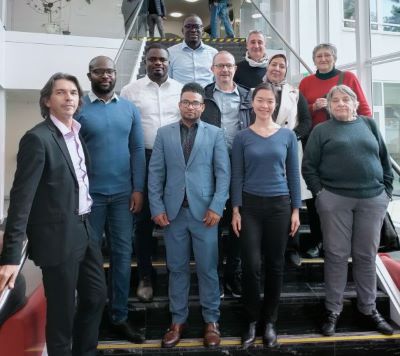
ERETES workshop:
Front row - Alexandre Ailloud (ITE at Statafric), Harouna Traoré (Insee/DATI),
José Fernandes (Cape Verde), Alice Tchang (Insee/DATI) ; Charlotte Schiltz (retired
from INSEE)
2d row - Brice Kamsu (Cameroon), Thierry Robisson (Orion engineer), Lamia Laabar (Morocco),
Sophie Bourrel (Insee/DATI)
3rd row - Khadim Sourang (Senegal), Jean-Samy Aziz (Insee/DRISS)
Software Installations
ERETES continued to be rolled out in Tunisia via two missions during the second half of 2023. The first mission, in July, saw the completion of work on previous years’ data that had already been published, and the second mission, in November, saw the team working to identity the data sources used and convert them into uploadable files (in ERETES format). The next mission will take place in Q1 2024. This will cover the process of uploading these sources into the software and the start of ongoing work to compile the national accounts using the tool, alongside their compilation using the current method.
As we announced in our previous newsletter, the process of setting up ERETES software for the first time in Liberia began last June. After introducing and installing the software, everyone in the team worked to reformat several Liberian data sources so that they were compatible with ERETES.
Lastly, ERETES deployment has been greenlit in Bolivia as part of the broader support framework for the Bolivian National Accounts Department mentioned previously. The software will begin to be rolled out in the first half of 2024 following Michel Séruzier’s initial exploratory mission in December 2023.
Joint support from AFRISTAT and INSEE on the communication of statistics
In 2023, communications accounted for much of the capacity-building work undertaken by AFRISTAT and INSEE alongside member state institutions.
Designing and drafting of Policy Briefs
In partnership with Ouvrir dans un nouvel ongletAFRISTAT, INSEE held a workshop on how to design and draft policy briefs at the Ouvrir dans un nouvel ongletPierre Ndiaye National School of Statistics and Economic Analysis (ENSAE) in Dakar (Senegal), from 3–7 July. The 27 participants represented NSIs and ministerial offices, central banks and regional organisations. The aim of the workshop was to learn the editorial techniques used at INSEE and to become acquainted with how to craft and draft a policy brief through a practical exercise, under the supervision of AFRISTAT team members who themselves were assisted by the INSEE team.
INSEE had previously run an initial training workshop for AFRISTAT trainers at ENSEA in Abidjan (22–26 May), which has enabled AFRISTAT to develop sustainable skills in this field.
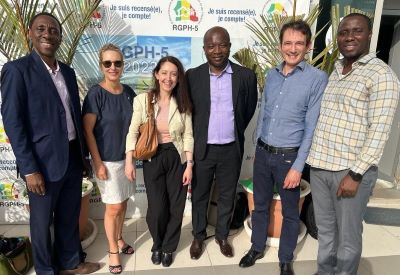
Standing in front of the ENSAE school in Dakar, from left to right: Serge Edi (AFRISTAT),
Claire Joutard and Cristina D’Alessandro (INSEE), Sansan Honkounne Kambou (AFRISTAT),
Olivier Gourdon (INSEE),Djabar Dine Adechian (AFRISTAT)
Data visualisation
Two data visualisation webinars were held on 10 and 11 October. This webinar series highlighted the importance of selecting the right images given the human resources available, financial costs (particularly if an external service needs to be used) and production time. Practical data production solutions that use open-source software were suggested.
INSEE attends 46th AFRISTAT Executive Committee meeting
INSEE sat in as an observer, on the 46th Ouvrir dans un nouvel ongletAFRISTAT Steering Committee meeting, which was held in N’Djamena, Chad, from 23–24 October. The meeting was an opportunity for AFRISTAT, one of INSEE’s special cooperative partners, to look back on the work it carried out in 2023 and outline its action plan for 2024, giving Member States and partner institutions the floor to state their aspirations and opinions.
Taking part in this meeting allowed INSEE to show its support for AFRISTAT and to gather information that is important for drawing up the following year’s cooperation plan. It was also an opportunity to discuss the requirements and challenges expressed by the NSIs and by the other institutions and organisations in attendance. The emphasis this year was repeatedly on the efforts required to improve the dissemination of data in member states and on the need for resources and skills to be steadily developed for the purposes of governing big data, e.g. a legal framework, IT tools and training.
The meeting ended with a presentation of the service provided by Géoclip, which showcased how statistical data can be leveraged using readily accessible geographic information systems. By making use of this service, AFRISTAT could provide an integrated solution and INSEE could share its experiences and expertise in regional data integrated into local statistics, which uses the service already.
A summary of INSEE’s cooperation activities in the second half of 2023
Regional activities
- PAN AFRICAN STATISTICS PROGRAMME (PASII)
Project coordination meetings
Mission in Warsaw (Poland)
September
Employment and the informal sector
Study visit in INSEE Head Office
September
Tourism Satellite Accounts
Preparatory meetings for the 2024 workshop, with Statistics Norway and Statistics
Denmark
Visit to INSEE Head Office
October
-
ECONOMIC COMMISSION FOR LATIN AMERICA AND THE CARIBBEAN (ECLAC)
Annual meeting of national accountants from South America
Webinar (participation)
October
-
STATECO JOURNAL
Webinar promoting the journal
Décember
-
PARIS21 - INSEE – AFRISTAT – UNECA – ACBF SERIES OF THEMED CONFERENCES
The role of NSIs in the environmental and climate change statistics production ecosystem
French-speaking countries in sub-Saharan Africa and the Maghreb region
Webinar
-
AFRISTAT – EXPERTISE FRANCE – INSEE – FERDI – DGFiP – DGDDI
Steering Committee for the Ouvrir dans un nouvel ongletDATAFIDproject
Videoconference
August
-
AFRISTAT – CAMEROON – CAPE VERDE – MOROCCO – SENEGAL
Developments in the new version of ERETES
Workshop in Paris
November
Sub-Saharan Africa
- AFRISTAT
Policy brief training
Joint INSEE/AFRISTAT workshop, at ENSAE
Dakar
July
Steering Committee
Taking part as an observer
Mission in N’Djamena (Chad)
October
POGUES training
Videoconferences
October – November
Quarterly accounts workshop
Videoconference
November
Quality
Study visit by a delegation that included the Director General of AFRISTAT and representatives
from the NSIs of Burundi and Cameroon
Montrouge
December
Visit by the Director General of AFRISTAT to INSEE Head Office
Montrouge
December
-
STATAFRIC
Preparation of the 2025 SNA
Webinar (participation)
July, August, October
-
SEMI-ANNUAL MEETING of the African GROUP on national accounts (AGNA)
Webinar (participation)
September
-
AFRICAN REGIONAL SEMINAR (UNECA / OECD)
Symmetrical Input-Output tables and Trade in Value-Added indicators
Webinar (participation)
October
-
MAURITANIA
Bilateral agreement with Mauritania’s National Agency for Statistics and Demographic and Economic Analysis (Ouvrir dans un nouvel ongletANSADE)
Steering Committee
Videoconference
July
-
IVORY COAST
Raising awareness of good management and ethical practices among graduates of the Ecole nationale supérieure de statistique et d’économie appliquée
Training in Abidjan
October
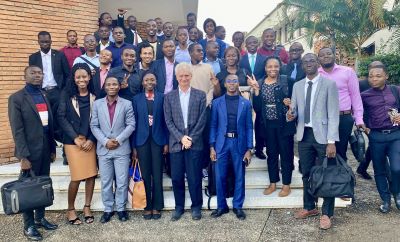
The second group of participants in the awareness-raising training
and Vincent Fruchart, an expert in institutional development
planning, monitoring and evaluation (fifth from the left in the front row)
The Maghreb and Mediterranean Basin
-
TUNISIA, MOROCCO
Practical training on web scraping applied to the CPI
Workshop in Tunis
October
-
ALGERIA
Urban structure and Permanent Equipment Database
Videoconference
November
- MOROCCO
Ouvrir dans un nouvel ongletHakama II project on European funding, 2020–2023
Boosting the capacities of the High Commission for Planning
Technical Committee
Mission in Rabat
December
Strengthening of the technical capabilities of external services
Training and support for regional communication
Mission in Agadir
November
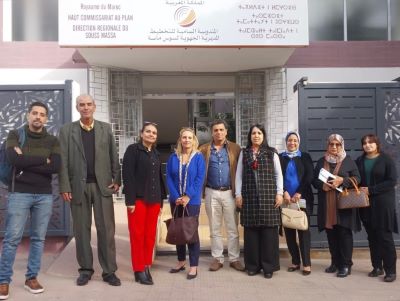
In Agadir: Lahoucine Al Aarabiou, Director for the Region of Souss-Massa/HCP (second
from the left);
Souhir Zerouali, Documentation and Information Management Specialist/HCP (third from
the left);
Claire Joutard, INSEE Provence-Alpes-Côte d’Azur; Hanane Houchimi,
Deputy Director for the Region of Souss-Massa/HCP (sixth from the left); and other
workshop participants
PASII: 2025 SNA trials – distributed household accounts
Mission in Rabat
December
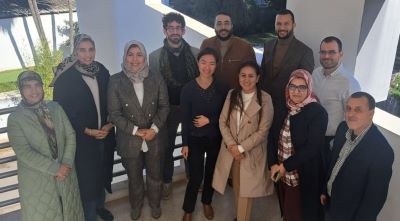
Participants from the Moroccan High Commission for Planning (HCP) and experts
Mathias André (INSEE/DCN) and Alice Tchang (INSEE/DATI)
(fourth and fifth from the left)
Modernising national accounts
Balance sheet, digital economy and agricultural accounts
Videoconference and mission in Rabat
October, December
Macroeconometric model
Creation of a short-term forecasting model
Videoconferences, mission in Rabat
October – December
- TUNISIA
New Base 2 national accounts project
Quarterly accounts
Mission in Tunis
September
EU-funded Savoirs Éco project in Tunisia
Launch event
Mission in Tunis
October
Discussions on communication
Videoconferences
November – December
Improving business statistics
Videoconference, mission in Tunisia
November – December
PASII: ERETES training
Missions in Tunis
July, November
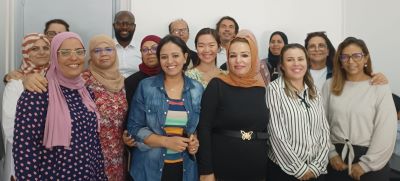
Participants from the Tunisian National Institute of Statistics and trainers Alice
Tchang
(fourth from the left in the second row), Harouna Traoré (INSEE/DATI,
second from the left in the back row) and Alexandre Ailloud
(international technical expert at STATAFRIC, 4th from the left in the back
row)


